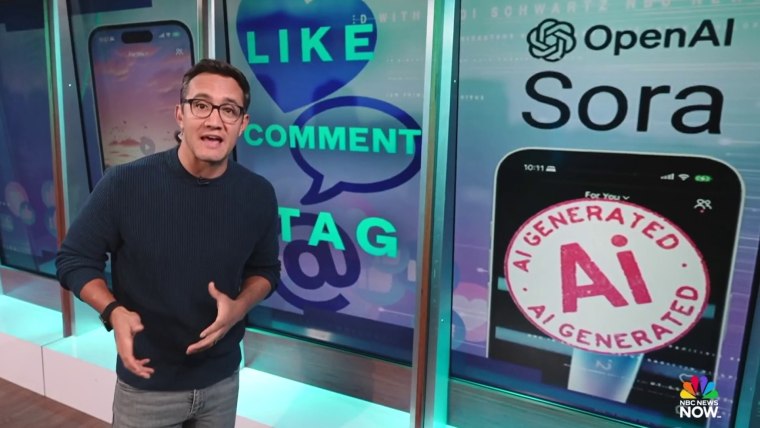-
Tigers' Zach McKinstry drives in go-ahead run in 11th inning vs. Mariners - 10 mins ago
-
San Francisco 49ers Linked to Shocking Mac Jones Trade - 20 mins ago
-
Carson Beck’s 4 TD Passes Helps No. 3 Miami Hold Off No. 19 Florida State - 53 mins ago
-
‘SNL’ Returns with Bad Bunny, New Cast for Season 51 - 59 mins ago
-
Mariners' Julio Rodríguez drives in a run to tie game vs. Tigers - 2 hours ago
-
Kansas City Chiefs Get Disturbing Patrick Mahomes Warning - 2 hours ago
-
Democratic candidates for governor focus on affordability and healthcare at labor forum - 2 hours ago
-
Cowboys Getting Explosive Offensive Weapon Back for Week 5 vs Jets - 2 hours ago
-
Kerry Carpenter clobbers two-run home run, giving Tigers lead over Mariners - 2 hours ago
-
Rite Aid closes all stores nationwide - 3 hours ago
China is starting to talk about AI superintelligence, and some in the U.S. are taking notice
Early last week in the Chinese tech hub of Hangzhou, a slick, larger-than-life video screen beamed out four words that would drive tech giant Alibaba’s stock to historic levels and signal a shift in China’s approach to artificial intelligence: “Roadmap to Artificial Superintelligence.”
During his 23-minute keynote address at the flagship Alibaba Cloud conference, Alibaba CEO Eddie Wu charted out a future featuring artificial general intelligence (AGI) and artificial superintelligence (ASI). These terms point to a theorized era in which AI becomes roughly as smart as humans (AGI) and then much, much smarter (ASI).
While these terms have been tossed around Silicon Valley for years, Wu’s presentation was notable: Alibaba is now the first established Chinese tech giant to explicitly invoke AGI and ASI.
“Achieving AGI — an intelligent system with general human-level cognition — now appears inevitable. Yet AGI is not the end of AI’s development, but its beginning,” Wu said. “It will march toward ASI — intelligence beyond the human, capable of self-iteration and continuous evolution.”
“ASI will drive exponential technological leaps, carrying us into an unprecedented age of intelligence,” Wu said, highlighting ASI’s ability to help cure diseases, discover cleaner sources of energy and even unlock interstellar travel.
The U.S. and China are the world’s leading AI powers, each with immense computing capabilities and top-tier researchers developing cutting-edge systems. Yet observers have framed the countries as having different approaches to AI, with perceptions that China focuses more on real-world AI applications.
For example, commentators recently argued that Beijing is currently “winning the race for AI robots” against the U.S., as China is home to much of the world’s most advanced robotics supply chains and a growing network of robotics, or embodied AI, labs.
“There’s been some commentary in Western media recently about how the U.S. is missing the point by pushing for AGI, while China is focusing solely on applications,” said Helen Toner, interim executive director of Georgetown’s Center for Security and Emerging Technology. “This is wrong.”
“Some Chinese researchers and some parts of the Chinese government have been interested in AGI and superintelligence for a long time,” Toner said, though she noted this view was primarily held by smaller startups like DeepSeek.
Afra Wang, a researcher focusing on China’s tech scene, said Alibaba’s invocation of AGI and ASI was remarkable.
“This ASI narrative is definitely something new, especially among the biggest tech companies in China,” she told NBC News.
Alibaba’s “roadmap to artificial superintelligence” seems to scramble mainstream perceptions. Any number of California techno-optimists, like Anthropic’s Dario Amodei or xAI’s Elon Musk, might have delivered Wu’s speech, selling a technology-enabled utopia while largely sidestepping darker questions about how humanity would co-exist with or survive an era of digital superintelligence.
The concept of superintelligence has long been on the minds of — if not explicitly guiding — prominent American AI companies. For example, OpenAI released an article focused on the safe development of superintelligent AI models in May 2023. “Now is a good time to start thinking about the governance of superintelligence — future AI systems dramatically more capable than even AGI,” the statement said.
The possibility of superintelligence is now even being acknowledged in Congress. On Monday, Sen. Josh Hawley, R-Mo., and Sen. Richard Blumenthal, D-Ill., announced a draft bill that would, among other actions, “assist Congress in determining the potential for controlled AI systems to reach artificial superintelligence.”
To some, ASI might seem like an outlandish concept when today’s AI systems fail to understand basic tennis rules, hallucinate or fabricate basic information, or do not seem to actually comprehend how the external world functions.
At the same time, AI systems continue to approach and sometimes surpass human capabilities in many domains, from driving cars safely to winning international coding competitions, leaving many experts to say it’s a matter of when, not if, humans develop digital superintelligence.
As the idea of superintelligence gradually enters mainstream debates, many American politicians have announced that the U.S. is in an AI race with China. The White House’s current AI manifesto is titled “Winning the AI Race: America’s AI Action Plan,” while Sen. Ted Cruz, R-Texas, proclaimed that “as a matter of economic security, as a matter of national security, America has to beat China in the AI race.”
Yet charges of an AI race are muddied by a lack of an agreed end goal and swirling definitions of AGI. At worst, experts think an unfettered race toward AGI or ASI could lead to widespread catastrophe or even the end of humanity.
But there’s also plenty of skepticism around talk of AGI and ASI and whether it’s primarily for marketing purposes.
Alibaba is one of China’s largest tech companies, known for providing powerful, free AI models — also called open-source models — for download. Alibaba’s Qwen model series, a competitor to models like OpenAI’s GPT-5 or Anthropic’s Claude, is the most popular open-source AI system in the world.

Wu announced a new series of Qwen models in his speech last week, including a model that combines text, images, video and audio capabilities.
Many observers point out that narratives about a U.S.-China AI race and a resulting sprint to build AI infrastructure serve AI investors by propping up company valuations and increasing their soft power. Alibaba’s stock has soared since Wu’s speech last week, part of a larger $250 billion comeback this year that has made it China’s hottest AI company.
To unlock a powerful, superintelligent future, Wu predicted that large AI models will replace existing operating systems as the link between users, software and computational power. This future network of large AI models will run on cloud computing networks like Alibaba Cloud, he said.
Irene Zhang, a researcher on China’s AI ecosystem and an editor of ChinaTalk, noted the business undertones of Wu’s announcement.
“This is a vision of AGI and ASI that’s directly based on Alibaba’s business model,” she said.
“Alibaba Cloud dominates China’s cloud computing market, and its global market share is now bigger than Oracle’s,” she said. “Alibaba’s commercial strategy and its publicly stated views on ASI/AGI are symbiotic.”
Matt Sheehan, a senior fellow at the Carnegie Endowment for International Peace, agreed.
“ASI is the ultimate frontier, as far as the discourse goes on AI,” Sheehan said. “It’s notable that Alibaba set this grandiose goal, but in reality, they’re selling cloud services.”
Source link































